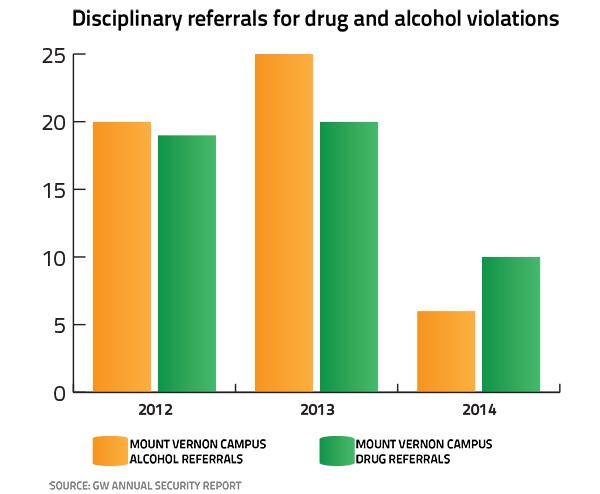The total number of students referred for disciplinary action because of drug and alcohol violations declined by about 50 percent last year.
Nearly 700 students were referred to Student Rights and Responsibilities for violating GW’s alcohol or drug policy in 2013, a number that dropped to 357 students last year, according to GW’s annual safety and security report. Officials said the numbers peaked in 2013 because of routine room searches that led GW to refer the students to SRR. But experts said the drop in referrals since then cannot be easily pinpointed to one specific cause.
There were 154 referrals for alcohol violations in 2014, down from 429 cases the year before. And 203 students were referred to SRR for drug violations last year, a 24 percent drop from 2013.
Reported alcohol violations in the first two weekends of school this year also dropped by around 50 percent, following a two-year trend of a decreasing number of violations.
University Police Department Chief RaShall Brackney said in an email the department is “pleased” with the drop in referrals last year. She said routine administrative searches that began in residence halls two years ago led to more than 200 student disciplinary referrals for alcohol violations.
“We continue to be committed to keeping our community safe and we are encouraged to see our students taking responsibility for their own health and safety and for the health and safety of others on campus,” Brackney said.
Alcohol violations on campus spiked two years ago when UPD officers began seeking out students who looked intoxicated, Senior Associate Vice President for Safety and Security Darrell Darnell said last year. He also said at the time that the University was paying special attention to catching students with fake IDs, which officials have historically said leads to more underage drinking.
Out of 101 total student referrals to SRR, there have been 88 referrals for drug and alcohol violations since move-in this fall, according to GW’s crime log.
Matthew Malhiot, a consultant at Forensic Alcohol Consulting and Training, said one reason for a decline could be that campus police officers are focusing on underage drinking or drug use more than in other areas.
“If the population believes there is a higher probability of them getting caught for something, they will not do it,” Malhoit said.







